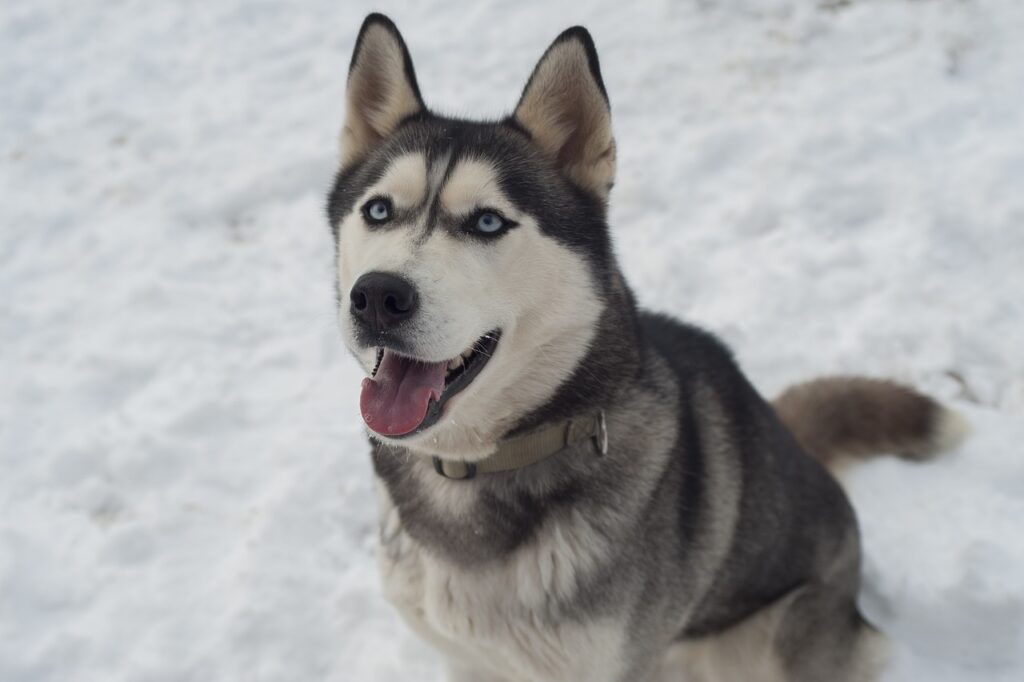As a proud parent of a Siberian Husky puppy, have you ever gazed into those mesmerizing blue eyes and wondered, “When do huskies stop growing?” Look no further, because we’ve got you covered in this informative, engaging, and friendly article! We will walk you through the stages of your Husky’s growth, factors that may affect their growth, and how you can support their healthy development.
Are you ready for this whirlwind tour into the world of Husky growth?
Table of Contents
The Stages of a Husky’s Growth
Understanding the stages of your Husky’s growth will help you anticipate their needs and support them as they grow. Here’s a brief breakdown of what you can expect:
- Birth to 2 weeks: The Neonatal Stage – Newborn puppies are entirely dependent on their mother for warmth, food, and waste elimination.
- 2 to 4 weeks: The Transitional Stage – Puppies begin to open their eyes, develop their sense of hearing, and take their first wobbly steps.
- 4 to 8 weeks: The Socialization Stage – Puppies start to interact with their littermates and humans, learning crucial social skills and bite inhibition.
- 8 to 16 weeks: The Juvenile Stage – Puppies experience rapid growth and development, learning about their environment and forming strong bonds with their family.
- 4 to 6 months: The Adolescent Stage – Puppies enter a phase of increased independence, testing boundaries, and exploring their world.
- 6 to 24 months: The Adult Stage – Growth begins to slow down, and puppies eventually reach their adult size and weight.
Factors Affecting Your Husky’s Growth
Why do some Huskies grow taller or bulkier than others? Here are a few factors that may influence your Husky’s growth:
- Genetics: A Husky’s genetic makeup plays a significant role in determining its growth potential.
- Nutrition: Providing a balanced, age-appropriate diet is crucial for supporting your Husky’s development.
- Exercise: Regular exercise encourages healthy muscle development and overall well-being.
- Health issues: Certain medical conditions can impact your Husky’s growth, such as hormonal imbalances or joint problems.
When Do Huskies Stop Growing?
So, when can you expect your fluffy bundle of joy to reach its full size? Generally, Siberian Huskies stop growing by the time they’re 18 to 24 months old. Male Huskies tend to reach their adult size slightly earlier than females.

However, it’s important to remember that every Husky is unique, and some may continue to fill out or gain muscle mass beyond two years of age.
How to Support Your Husky’s Growth
To ensure your Husky grows up strong and healthy, follow these guidelines:
- Provide a balanced diet: Consult your veterinarian to determine the best diet for your Husky, taking into account their age, weight, and activity level.
- Monitor growth: Regularly weigh your Husky and track their growth to ensure they’re developing at an appropriate rate.
- Exercise and mental stimulation: Engage your Husky in regular physical activity and mental exercises to promote muscle development and overall well-being.
- Schedule regular vet visits: Regular check-ups with your veterinarian will help identify any potential growth issues early on and ensure your Husky remains in good health.
Potential Growth Issues
As a responsible Husky parent, it’s crucial to be aware of potential growth-related issues that may affect your puppy:
- Growth plate injuries: These can occur in young dogs with still-developing bones, and they may require veterinary intervention.
- Obesity: Overfeeding or lack of exercise can lead to obesity, putting unnecessary strain on your Husky’s joints and potentially stunting their growth.
- Hip dysplasia: This genetic condition is more common in larger breeds, and it can cause joint pain, inflammation, and reduced mobility.
- Hypothyroidism: An underactive thyroid can result in slow growth and weight gain, among other symptoms. Early diagnosis and treatment are essential.
Frequently Asked Questions
- Can I estimate my Husky’s adult size? While it’s difficult to predict your Husky’s exact adult size, looking at their parents and breed standards can give you a rough idea of their potential growth.
- Is it possible to speed up my Husky’s growth? Trying to accelerate your puppy’s growth is not recommended, as it can lead to health issues. Instead, focus on providing a balanced diet, exercise, and regular vet check-ups to support their healthy development.
- What if my Husky is growing too slowly? If you’re concerned about your Husky’s growth rate, consult your veterinarian. They can help determine if there’s an underlying issue or if your puppy is simply a late bloomer.
Key Takeaways
- Siberian Huskies generally stop growing by 18 to 24 months of age, with males often reaching their adult size earlier than females.
- Genetics, nutrition, exercise, and health issues can all influence your Husky’s growth.
- Support your Husky’s healthy development by providing a balanced diet, monitoring their growth, ensuring regular exercise and mental stimulation, and scheduling routine vet visits.
- Be aware of potential growth issues such as growth plate injuries, obesity, hip dysplasia, and hypothyroidism.
Now that you’re armed with this wealth of information on when Huskies stop growing, you can confidently watch your puppy grow into a majestic, healthy adult.
Remember that every Husky is unique, so celebrate your pup’s individual journey and enjoy the ride!


Dennis and Becca, have always shared a passion for man’s best friend. As dog enthusiasts, they put together articles that inform, engage, and captivate fellow dog lovers.